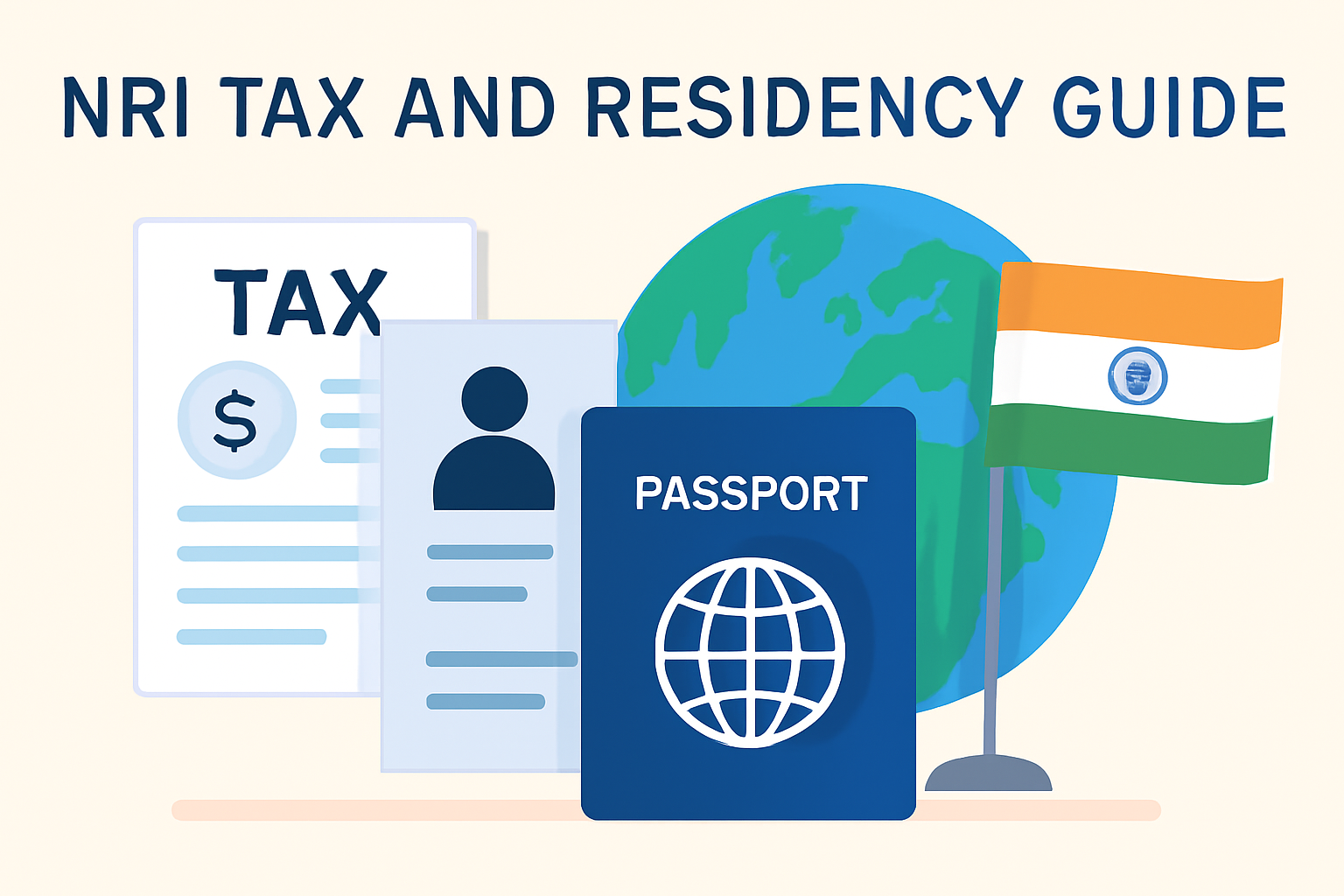Are you an NRI or an Indian citizen living abroad trying to make sense of your tax liability in India for the Financial Year 2024-25? The rules have changed significantly. The old 182-day benchmark is no longer the only factor, and a stay of just 120 days could now make you a tax resident. This comprehensive guide breaks down the complex amendments, explains the crucial ‘Resident but Not Ordinarily Resident’ (RNOR) status, and provides an interactive calculator to help you determine where you stand. We’ll explore real-world case studies, compare FEMA and Income Tax Act residency, and give you the strategic insights needed to manage your Indian income effectively.
NRI Taxation Guide
Navigating Indian Tax Residency: A Comprehensive Guide for NRIs (FY 2024-25)
A deep dive into the Income Tax Act, 1961, the 2020 amendments, and what they mean for your financial liability in India.
Key Takeaway
The rules have changed. An Indian citizen visiting India with local income over ₹15 lakhs can become a Resident but Not Ordinarily Resident (RNOR) by staying for just 120 days, not 182. This status cleverly taxes your Indian income while shielding your global earnings, striking a balance between tax collection and NRI convenience.
Residency Status Calculator
Not sure where you stand? Answer the questions below to get an instant estimate of your residential status for FY 2024-25.
Your Estimated Status is:
--
Enter your details to see the result.
Part I: The Framework of Tax Residency in India
Section 1: The Three Tiers of Residential Status
The foundation of your tax liability in India isn't your citizenship, but your residential status for a financial year. The Income Tax Act, 1961, classifies individuals into three distinct categories, each with a different scope of tax liability.
Resident & Ordinarily Resident (ROR)
Maximum tax liability. You are taxed on your worldwide income.
Resident but Not Ordinarily Resident (RNOR)
A balanced middle-ground. Taxed only on Indian-sourced income and foreign income from a business controlled in India.
Non-Resident (NR)
Most limited liability. Taxed only on income that accrues, arises, or is received in India.
Section 2: The Basic Conditions for Residency
To be a "Resident," you only need to satisfy one of two basic conditions laid out in Section 6(1) of the Act.
Test 1: The 182-Day Rule
You are a resident if your physical stay in India during the financial year is 182 days or more.
Test 2: The 60+365 Day Rule
You are a resident if you stay for 60+ days in the financial year AND 365+ days in the four preceding years.
Part II: The 2020 Amendments - A New Paradigm for NRIs
The Finance Act, 2020, introduced crucial changes to prevent tax avoidance and bring high-income NRIs into the tax net. These changes are the core of the modern NRI tax landscape.
Section 3: The 120-Day Rule: A Critical Modification
For Indian citizens or PIOs visiting India with Indian-sourced income over ₹15 lakhs, the 60-day threshold in "Test 2" is extended to 120 days. This is the game-changer.
The New 120-Day Test for NRIs
Indian Income
Stay in FY
Stay in 4 Prior FYs
You are a Resident
Section 4: The Deemed Residency Provision
To target "stateless persons," a new Section 6(1A) was introduced. An Indian citizen is deemed to be a Resident (irrespective of stay) if their Indian income exceeds ₹15 lakhs and they are not liable to tax in any other country.
Understanding "Not Liable to Tax"
This term is key. It refers to a situation where a person is not taxed in a foreign country due to their citizenship, residence, or any other similar criteria. For example, some countries like the UAE do not have a personal income tax regime. An Indian citizen living there might not be "liable to tax" and could fall under this provision if their Indian income is above the threshold. This rule ensures high-income individuals cannot remain outside the tax jurisdiction of all countries.
Residency Status Determination Flowchart
or "Non-Resident" (if No)
Part III: The Crucial Distinction: ROR vs. RNOR
Once you are a "Resident," a second layer of tests determines if you are an ROR (taxed on global income) or an RNOR (taxed on Indian income). There are two pathways to becoming an RNOR.
Pathway 1: The Traditional RNOR Conditions
Even if you are a "Resident," you are considered an RNOR if you satisfy any one of the following conditions:
- You have been a Non-Resident in India in 9 out of the 10 financial years preceding the current one.
- Your stay in India has been for a total of 729 days or less during the 7 financial years preceding the current one.
This is the standard test for individuals who might be residents in a given year but have not been in India for long periods historically.
Visualizing the Look-Back Periods for RNOR Status
Current FY (2024-25)
Your residency status is determined for this year.
Test A: 7-Year Look-Back
Period: FY 2017-18 to 2023-24
Condition: Is your total stay in this period 729 days or less? If yes, you are RNOR.
Test B: 10-Year Look-Back
Period: FY 2014-15 to 2023-24
Condition: Were you a Non-Resident in 9 out of these 10 years? If yes, you are RNOR.
Note
Meeting just one of these conditions makes you an RNOR for the current financial year.
Pathway 2: The Automatic RNOR Classification
This is the most important takeaway for high-income visiting NRIs. If you become a "Resident" solely because of the new 120-day rule, the law automatically classifies you as an RNOR for that financial year. This is a deliberate "safety valve" to tax your Indian income without over-punishing you by taxing your global earnings.
Part IV: Residency under FEMA vs. Income Tax Act
A common point of confusion is the difference between residency for tax purposes (Income Tax Act) and for financial transactions (FEMA). The two are determined independently and have different implications.
Residency for Income Tax
- Purpose: To determine your tax liability in India.
- Key Criteria: Number of days of physical stay in India during a financial year (182/120/60 days).
- Status: ROR, RNOR, or NR.
- Impact: Determines the scope of your taxable income (global vs. Indian).
Residency for FEMA
- Purpose: To regulate foreign exchange transactions, investments, and property ownership.
- Key Criteria: Stay of more than 182 days in the preceding financial year. Intent is also considered.
- Status: Resident or Non-Resident.
- Impact: Governs your ability to open certain bank accounts (NRE/NRO), invest in property, and remit funds abroad.
It's possible to be a "Resident" under the Income Tax Act but a "Non-Resident" under FEMA in the same year, or vice-versa. Always assess your status under both laws separately.
Part V: The Financial Impact & Scope of Taxable Income
Your residential status directly dictates what income is taxable in India. The RNOR status offers a significant tax shield on your foreign income.
Interactive: Scope of Taxable Income
Comparative Analysis of Tax Liability
| Type of Income | ROR | RNOR | NR |
|---|---|---|---|
| Indian Income | |||
| Salary for services in India | Taxable | Taxable | Taxable |
| Rental income from Indian property | Taxable | Taxable | Taxable |
| Foreign Income | |||
| Salary for services outside India | Taxable | Non-Taxable | Non-Taxable |
| Rental income from foreign property | Taxable | Non-Taxable | Non-Taxable |
| Special Case | |||
| Income from business controlled from India | Taxable | Taxable | Non-Taxable |
Part VI: Real-World Scenarios & Case Studies
Let's apply these complex rules to some practical examples to see how they play out.
Case 1: The IT Consultant on a Long Visit
Profile: Priya, an Indian citizen working in the US, visits her family in India.
- Stay in FY 2024-25: 150 days.
- Indian Income (FY 24-25): ₹20 Lakhs (from freelancing).
- Stay in prior 4 years: 400 days.
Outcome: RNOR. She crosses the 120-day threshold with Indian income over ₹15 lakhs and 365+ days in prior years. She is automatically an RNOR. Only her ₹20 Lakhs Indian income is taxable.
Case 2: The Casual Vacationer
Profile: Rohan, an Indian citizen working in the UK, takes a holiday in India.
- Stay in FY 2024-25: 110 days.
- Indian Income (FY 24-25): ₹5 Lakhs (rental income).
- Stay in prior 4 years: 500 days.
Outcome: Non-Resident. Although he meets the 365-day condition, his income is below ₹15 lakhs and his stay is below 120 days. The standard 60-day rule doesn't apply to visiting Indian citizens. He will only pay tax on his ₹5 Lakhs rental income.
Case 3: The "Digital Nomad" in Dubai
Profile: Sameer, an Indian citizen, lives in the UAE (no personal tax) and works remotely.
- Stay in FY 2024-25: 30 days.
- Indian Income (FY 24-25): ₹25 Lakhs (stock market gains).
- Tax Liability in UAE: Nil.
Outcome: Deemed Resident (RNOR). Regardless of his short stay, his Indian income is over ₹15 lakhs and he is not liable to tax in the UAE. He is deemed a resident and automatically becomes an RNOR. His ₹25 lakhs Indian income is taxable.
Part VII: Taxation of Key Income Sources for NRIs/RNORs
Beyond salary and rent, here's how other common income types are treated for Non-Residents and RNORs.
💰 Capital Gains
Tax on capital gains depends on the location of the asset.
• Indian Assets: Sale of Indian property, shares of Indian companies, or Indian mutual funds is always taxable in India, irrespective of your residential status.
• Foreign Assets: Not taxable for NR or RNOR.
💸 Dividend Income
• From Indian Companies: Dividends received from Indian companies are considered Indian-sourced income and are taxable for all (NR, RNOR, and ROR) at the applicable slab rates.
• From Foreign Companies: Not taxable for NR or RNOR.
🏦 Interest from Bank Accounts
• NRO Account: Interest earned in a Non-Resident Ordinary (NRO) account is taxable in India.
• NRE Account: Interest earned on a Non-Resident External (NRE) account is tax-exempt in India. This is a significant benefit for NRIs.
🎁 Gifts
Gifts received from relatives (as defined in the Income Tax Act) are generally not taxed. However, gifts from non-relatives exceeding ₹50,000 can be taxed as "Income from Other Sources." The location where the gift is received is crucial for determining taxability for NRIs.
Part VIII: Special Tax Rates for NRIs
While most Indian income is taxed at normal slab rates, certain incomes for NRIs are taxed at special, flat rates which can be beneficial. These special rates are applicable if the NRI does not opt for the new tax regime.
| Type of Income | Tax Rate |
|---|---|
| Short-Term Capital Gains on listed equity shares/units (Sec 111A) | 15% |
| Long-Term Capital Gains on listed equity shares/units over ₹1 lakh (Sec 112A) | 10% |
| Long-Term Capital Gains on other assets (e.g., property) | 20% (with indexation benefits) |
| Interest on certain Indian government securities or corporate bonds (Sec 194LC) | 5% |
| Other income (e.g., rental, NRO interest, other capital gains) | As per applicable slab rates |
Note: NRIs are not entitled to the basic exemption limit on income taxed at special rates (e.g., LTCG under Sec 112A). However, this benefit can be claimed against income taxed at slab rates.
Part IX: Frequently Asked Questions (FAQ)
Do the days of arrival in and departure from India count towards the stay period?
Yes. The Central Board of Direct Taxes (CBDT) has clarified that the day of arrival and the day of departure are both counted as days of stay in India. You must keep a precise calendar of your travel dates.
What exactly is "income from a business controlled from India"?
This is a fact-based determination. "Control and management" is considered to be situated at the place where the key managerial and commercial decisions for the business are made. If the top-level decisions (e.g., policy, finance, strategy) are made by directors or partners while they are physically present in India, the business may be considered controlled from India, making its global profits taxable for RORs and RNORs.
I became an RNOR under the 120-day rule. Can I still claim DTAA benefits?
Yes. The RNOR status determines what income is *scoped* into your Indian tax return. For the income that is taxable in India (e.g., your Indian salary or rental income), you can still invoke the relevant Double Taxation Avoidance Agreement (DTAA) between India and your country of residence to avoid being taxed on the same income twice. The DTAA may specify which country gets the first right to tax certain incomes.
What is the difference between Indian-sourced income and income received in India?
Indian-Sourced Income (or income that "accrues/arises" in India) is income earned from an activity or asset located in India. Example: Salary for work done in India, rent from a property in India.
Income Received in India is any income, regardless of where it was earned, that is first received directly into an Indian bank account. For example, if your US salary is directly credited to your Indian bank account, it becomes taxable in India for everyone, including NRs. It is always advisable to have foreign income credited to a foreign bank account first.
Part X: Advance Tax Liability for NRIs and RNORs
If your estimated tax liability in India for a financial year is ₹10,000 or more, you are required to pay advance tax. This applies to NRIs and RNORs just as it does to residents.
When is Advance Tax Applicable?
Advance tax is payable on all types of Indian income that are not subject to Tax Deducted at Source (TDS), or where TDS is deducted at a lower rate than your actual liability. Common examples for NRIs include:
- Rental Income (TDS is deducted, but may not cover full liability).
- Capital Gains from sale of property or securities.
- Interest income from NRO accounts or other deposits.
- Dividend income.
Important: You do not need to estimate capital gains income in advance. Any tax on capital gains can be paid in the remaining installments after the gain is realized.
Part XI: Compliance and Strategic Outlook
Understanding the rules is half the battle. Proper compliance and strategic planning are essential to manage your tax obligations effectively.
📄 ITR Forms
Use ITR-2 for salary, property, and capital gains. If you have business income (including a foreign business controlled from India), file ITR-3.
🌍 Foreign Asset Reporting
Major relief for RNORs! Unlike RORs, you are exempt from the complex reporting of foreign assets in Schedule FA.
🤝 DTAA Benefits
You can use Double Taxation Avoidance Agreements to prevent the same income from being taxed twice and potentially get lower tax rates.
🗓️ Meticulous Day Counting
Your entire status hinges on days of stay. Keep precise records of your travel dates to avoid any miscalculations.
💸 Income Segregation
Keep foreign and Indian income separate. Receiving foreign salary directly into an Indian bank can make it taxable.
🧠 Manage "Control"
If you have a foreign business, ensure key strategic decisions are not made while you are in India to protect its profits from Indian tax.










